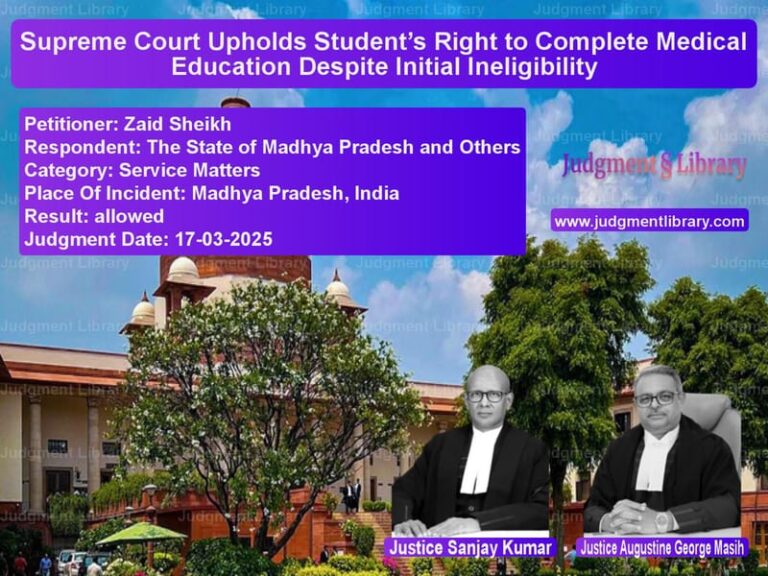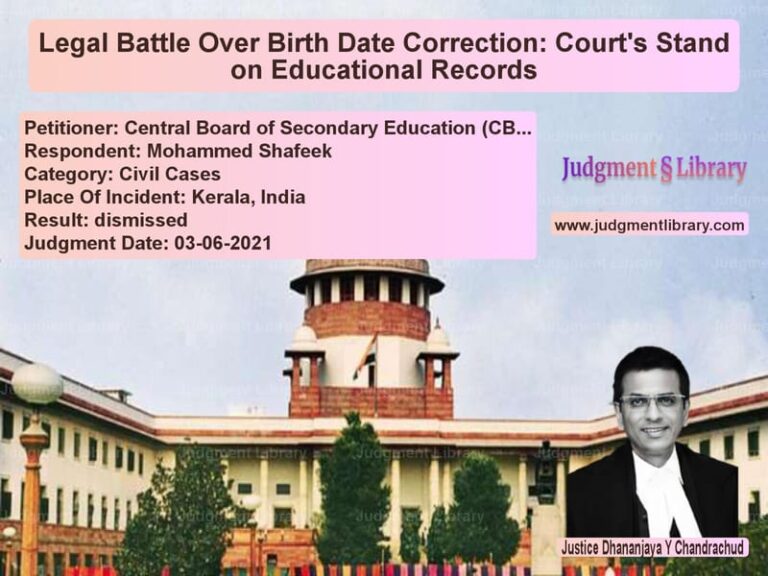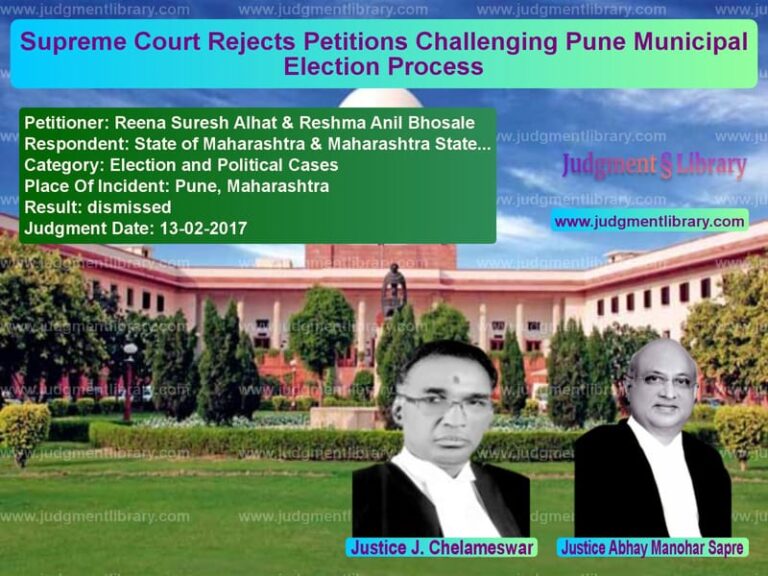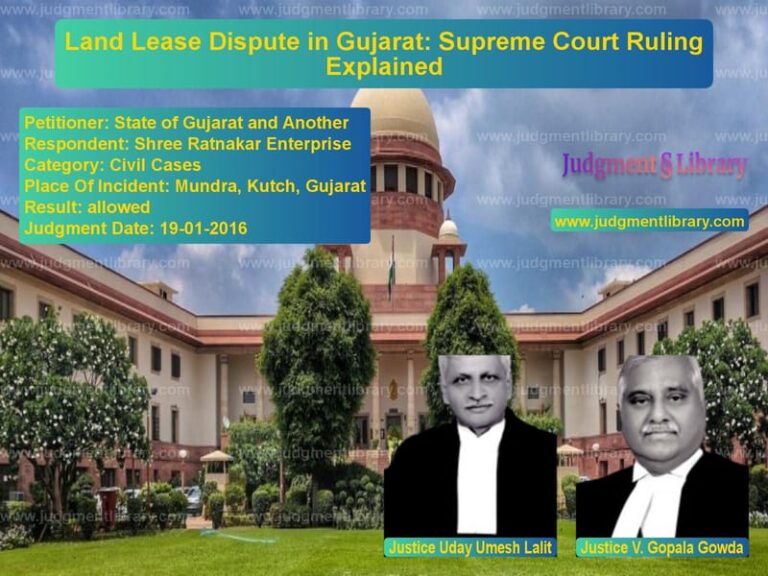Supreme Court Restores Long-Pending Civil Appeals in Specific Performance Dispute
The Supreme Court of India recently ruled in the case of Om Prakash Gupta Alias Lalloowa & Ors. v. Satish Chandra & Ors., restoring two second appeals that had abated due to procedural lapses. The judgment addresses crucial issues in procedural law, including the impact of delays in substitution applications, the rights of legal heirs in long-pending civil litigation, and the duty of courts to ensure justice is not denied due to technicalities.
Background of the Case
The dispute originated from two civil suits for specific performance of agreements to sell immovable properties:
- One suit was filed by Satish Chandra against Om Prakash Gupta in 1972.
- The other suit was filed by Rooprani (wife of Satish Chandra) against Om Prakash Gupta and his minor sons in 1973.
Both suits were initially dismissed by the trial court, but the first appellate court decreed them in favor of the plaintiffs. Om Prakash Gupta then filed second appeals before the Allahabad High Court, where the decrees were stayed pending adjudication.
During the pendency of the appeals:
- Satish Chandra died in 1996, and his heirs applied for substitution.
- Om Prakash Gupta died in 2001, but his heirs did not file a substitution application in time.
- In 2007, the High Court held that the second appeal had abated due to the failure to substitute the legal heirs of Satish Chandra.
- In 2017, the heirs of Satish Chandra and Rooprani initiated execution proceedings, prompting the heirs of Om Prakash Gupta to seek restoration of the appeals.
Key Legal Issues Considered
- Whether the High Court erred in dismissing the second appeals as abated due to procedural delays.
- Whether the heirs of a deceased litigant can rely on substitution applications filed by the opposing party.
- Whether the court has the discretion to condone delays and revive abated appeals in the interest of justice.
Petitioners’ Arguments (Heirs of Om Prakash Gupta)
The petitioners contended:
- The second appeals should not have abated as the legal heirs of Satish Chandra had already filed a substitution application.
- The delay in filing substitution applications for Om Prakash Gupta was unintentional and should be condoned in the interest of justice.
- Procedural lapses should not override substantive justice, particularly in long-pending property disputes.
- The execution proceedings initiated by the legal heirs of the plaintiffs were premature as the appeals had not been adjudicated on merits.
Respondents’ Arguments (Heirs of Satish Chandra and Rooprani)
The respondents argued:
- The petitioners had ample opportunity to file substitution applications but failed to act diligently.
- Since the appeals had abated, the decree-holders were entitled to execute the decrees.
- Procedural delays should not be condoned where they indicate a lack of due diligence on the part of the appellants.
Supreme Court’s Observations and Ruling
The Supreme Court ruled in favor of the petitioners, setting aside the High Court’s order of abatement and restoring the second appeals.
Key Observations by the Court:
- “The purpose of procedural law is to facilitate justice, not to obstruct it. Technicalities should not defeat substantive rights.”
- “The application for substitution filed by the heirs of Satish Chandra amounted to an effective notice of death, and the failure of the opposing party to file a separate application should not be fatal.”
- “When a second appeal is pending for decades, the High Court should consider the merits rather than dismissing it on procedural grounds.”
- “The courts must adopt a justice-oriented approach to procedural lapses, particularly in property disputes where the rights of legal heirs are at stake.”
Final Judgment
The Supreme Court issued the following directives:
- The second appeals were restored to their original numbers and ordered to be heard on merits.
- The legal heirs of Satish Chandra and Rooprani were brought on record as substituted respondents.
- The High Court was directed to expedite the hearing and dispose of the appeals within six months.
- All pending applications in the case were disposed of.
Impact of the Judgment
This ruling has significant implications for civil litigation:
- Ensuring procedural fairness: Courts must balance procedural requirements with substantive justice.
- Clarifying substitution requirements: If one party files a substitution application, it can benefit both sides.
- Protecting legal heirs’ rights: Long-pending property disputes should not be dismissed due to procedural lapses.
- Encouraging expeditious disposal: The directive to hear the appeals within six months ensures timely justice.
Conclusion
The Supreme Court’s judgment in this case reaffirms the principle that procedural technicalities should not obstruct substantive justice. By restoring the second appeals, the Court has ensured that the long-standing property dispute is decided on merits rather than being dismissed on procedural grounds.
Petitioner Name: Om Prakash Gupta Alias Lalloowa & Ors..Respondent Name: Satish Chandra & Ors..Judgment By: Justice Dipankar Datta, Justice Prashant Kumar Mishra.Place Of Incident: Allahabad, Uttar Pradesh.Judgment Date: 11-02-2025.
Don’t miss out on the full details! Download the complete judgment in PDF format below and gain valuable insights instantly!
Download Judgment: om-prakash-gupta-ali-vs-satish-chandra-&-ors-supreme-court-of-india-judgment-dated-11-02-2025.pdf
Directly Download Judgment: Directly download this Judgment
See all petitions in Property Disputes
See all petitions in Succession and Wills
See all petitions in Judgment by Dipankar Datta
See all petitions in Judgment by Prashant Kumar Mishra
See all petitions in allowed
See all petitions in Remanded
See all petitions in supreme court of India judgments February 2025
See all petitions in 2025 judgments
See all posts in Civil Cases Category
See all allowed petitions in Civil Cases Category
See all Dismissed petitions in Civil Cases Category
See all partially allowed petitions in Civil Cases Category







